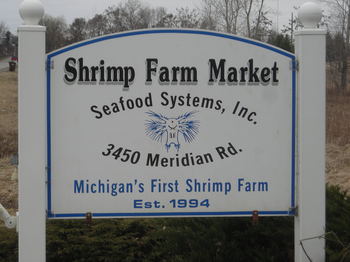The Shrimp Farm Market's vision for a Michigan shrimp industry
This is the second part of in a two-part discussion about my visit to The Shrimp Farm Market in Okemos. I already detailed the differences between farming and harvesting shrimp from the wild. Today, I am going to focus on what makes The Shrimp Farm Market such a valuable resource and potential for us in Michigan.

The Shrimp Farm Market hopes to spearhead a Michigan shrimp farm industry.
Corinna Borden | Contributor
A veteran of the shrimp farming industry for more than 30 years, Allen was ideally placed to spearhead an indoor, biologically secure and sustainable model for growing shrimp when he moved back to Michigan with his family in the 1990s.
“We never expected that it would be competitive to grow shrimp this way. Through the process of developing the technology and learning a lot about what was going on here in the States, we learned that it can be done on a commercial scale. It can be the cheapest way to farm shrimp in the world and the most environmentally friendly way. We can compete with China.”
The biggest cost in aquaculture is food.
As Allen explains, “Our feeds are the same as the other feeds. But in the United States we have the cheapest grain costs in the world. Through our system we have shown we can grow shrimp with less than a one to one conversion ratio. We can grow one pound of shrimp with less than one pound of food.”
“And a typical shrimp farm would be a pound and a half to two pounds of food for a pound of shrimp with higher feed costs. When you take a look at combining the ability to have really cheap feed and the lowest feed costs - it allows you be very competitive.”
The reason that the feed costs are so low for Allen is he has developed a system whereby the food is essentially recycled. The shrimp release ammonia, bacteria turn the ammonia to nitrites, another form of bacteria turn the nitrites to nitrates, and then those nitrates can be turned into more bacteria or they can feed algae. Shrimp will then eat the bacteria and the algae and start the whole process over again.
As Allen explains, “Everything is reused. Shrimp are bacterial grazers. The waste turns into bacteria and the bacteria turns into food for the shrimp. In the end we don’t have any significant waste or sludge because we are recycling everything. The bacteria are doing it for us.”
The Shrimp Farm Market oversees every step of the rearing process, the breeding of the shrimp, the spawning (a mature female shrimp can produce from 60,000-200,000 eggs at once), the rearing of the larvae, and the maturation of the shrimp. The entire process takes about five to six months.
Allen is adding whitefish and yellow perch to diversify his offering and to offer more opportunities to grow algae to feed the shrimp.
As Tim Redmond, of Blue Horizon Organic Shrimp Seafood Company, says, “When you look at Russ Allen’s operation, not only it is a good clean system, chemical free - there is no destruction of other life. You can feel good as a consumer.” Most shrimp trawling involves a significant amount of collateral damage to the benthos and benthic zone, as I discussed yesterday.
The Shrimp Farm Market shrimp is sold via Eat Local Eat Natural to Eve, the Grange, the Gandy Dancer, and Ann Arbor Brewing Co. You can also purchase the shrimp at The Shrimp Farm Market store, open Friday 11 a.m.-6 p.m. and Saturday 10 a.m.-1 p.m., located at 3450 Meridian Road, Okemos.
Contact Allen to talk to him about his private placement memorandum for a commercially viable Michigan shrimp industry.
Michigan consumes 10 million pounds a year of shrimp - wouldn’t it be great if we could not only feed that demand, but feed America’s demand for 1.5 billion pounds a year? Allen thinks we can.
Corinna works with the Westside Farmers Market and writes about many things.


Comments
Sarah Rigg
Wed, Apr 7, 2010 : 7:49 a.m.
These posts on the shrimp farm were both super interesting- I had no idea you could be a locavore and eat shrimp. Thanks for reporting on this!